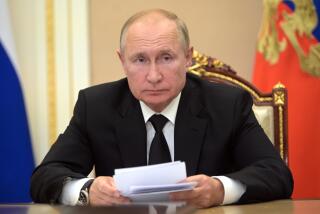Some See Wide Net Cast by Ban on Myanmar
Unocal Corp. and other U.S. firms may find the White House ban on new investment in Myanmar has implications extending far beyond that country, potentially jeopardizing projects in other Southeast Asian economies as well, some experts say.
A broad interpretation of the presidential ban could threaten billions of dollarsâ worth of business throughout Southeast Asia, crippling U.S. firms in one of their fastest-growing markets, according to a group representing 450 major companies active in the region.
Although business executives and trade lawyers are still studying the executive order issued this week, the U.S.-ASEAN Business Council says the ban could even prohibit participation in regional projects that extend from another country into Myanmar.
If Myanmar (formerly Burma) joins the Assn. of Southeast Asian Nations, or ASEAN, as expected this year, âall of these regional transportation, telecommunications . . . all of these regional networks are going to have a Burma element in them,â said Ernest Bower, president of the council. âWe stand to lose enormous amounts of business.â
Other experts say the ban casts a wider net than expected around projects within Myanmar and may create more problems for energy companies already involved in projects there--such as Unocal, Atlantic Richfield Co. and Texaco Inc., the leading U.S. investors--than those firms realize.
Although the executive order allows such companies to complete ongoing contracts, it is not clear whether they will be able to engage in any additional work that would require new funds, such as building a pipeline to get their gas to market, according to legal and government sources.
âUnocal is going to have trouble going forward under this,â said David Schmahmann, an international legal expert with the Boston law firm of Nutter, McClennen & Fish.
Schmahmann said the ban does not clearly define ânew investmentâ and unexpectedly prohibits investment into natural resources and agriculture, as well as financial, industrial and human resource areas.
And though it doesnât cover foreign subsidiaries of U.S. firms,it prohibits U.S. firms from approving or facilitating any transactions by foreigners that would be considered illegal under the presidential ban. The ban carries a penalty of up to 10 years in prison and a $55,000 fine.
But no one is certain yet just what is illegal, which is why these U.S. firms are lining up to meet with officials of the Treasury Department, whose Office of Foreign Assets Control will be enforcing the measure. The department is expected to issue its enforcement regulations for the Myanmar ban in a month.
âThere is a lot of gray area here,â a department representative acknowledged. âWhere it is still unclear is when it comes to an exploratory deal or a deal that would require new investment down the road.â
For energy companies, the critical question is whether they will be prohibited from completing the infrastructure needed to bring oil or natural gas to market.
Anything that restricts future development off the coast of Myanmar would be particularly harmful to Unocal, which has been a pioneer in energy development in Southeast Asia, according to Julia Nanay, a director of Washington-based Petroleum Finance Co.
The Myanmar project âis part and parcel of their business in Thailand and is part of the whole Asian energy development scheme they would like to promote,â she said.
Even U.S. firms selling goods and services in Myanmar could be affected, since the ban prohibits them from signing contracts in which they are paid through royalties, earnings or profits created in Myanmar or equity shares in businesses developing resources in that country. Officials for the three U.S. oil giants remain optimistic that they will be allowed to follow their ongoing projects--from Unocalâs $1.2-billion gas pipeline project to Texacoâs and Arcoâs gas exploration contracts--through to completion.
âWe believe the presidential order and the intent of Congress was to allow companies such as ours that have made investments to proceed with the investments, and we interpret that to mean exploration and development,â said Al Greenstein, a spokesman for Arco.
Michael Malloy, a sanctions expert at the University of the Pacificâs law school in Sacramento, predicted that the Treasury Department will take a narrow view of the presidential ban, focusing its attention on keeping new U.S. players out of Myanmar.
But that could change, Malloy said, if the political situation in Myanmar worsens.
More to Read
Inside the business of entertainment
The Wide Shot brings you news, analysis and insights on everything from streaming wars to production â and what it all means for the future.
You may occasionally receive promotional content from the Los Angeles Times.










